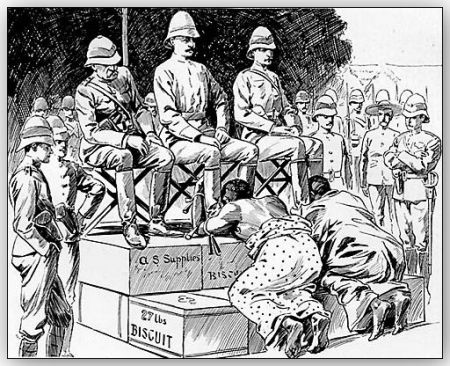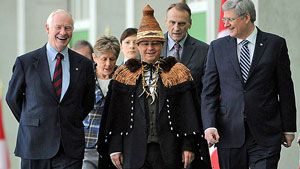STORY about Indigenous posted on January 24, 2012 by Zig Zag
Off to see the Wizard: the 2012 AFN-Crown Summit
Also posted by Zig Zag:
Also in Indigenous:
WarriorPublications.wordpress.com, January 24, 2012
Like bannock, band councils, and blockades, Native delegations to see the “Great White Father” are by now an entrenched part of Native culture. Always presented as something new and dynamic, they follow a predictable pattern: militant sounding chiefs go to the colonial fort, hat in hand, to ask for more money and power from their political masters. If their demands are not met, there will be an Indian uprising…
On January 24, 2012, more than 400 Indian Act band council chiefs met with Canadian Prime Minister Stephen Harper, Aboriginal Affairs Minister John Duncan and 11 other cabinet ministers for a Crown-First Nations summit. The chiefs were demanding more money and power, using the oppressed living conditions of Indigenous peoples as political leverage in their bargaining. To further their agenda, the chiefs threatened that a “new relationship” was needed between First Nations and the Crown or Canada would risk “widespread unrest.”
For the state, the summit was obviously a public relations exercise from the very start. First promoted during the Assembly of First Nations’ (AFN) annual general assembly in July 2010, the Harper administration only agreed to it in the wake of the housing crisis in the Cree community of Attawapiskat, in December 2011. In the face of such a crisis, which became a national scandal, the state had to be seen as acting in the interests of Native peoples.
For their part, the chiefs must be seen as defending their people and communities. In an interview with the Canadian Press, Grand Chief Derek Nepinak, head of the Assembly of Manitoba Chiefs, was quoted as saying “The summit is only for one day and… First Nations are tired of being trotted out for photo opportunities. They want to see some real change.” Nepinak stated that “It’s a small window of opportunity. We’re going to do our best to kick that window in.” (“New Relationship needed with Crown or risk widespread unrest: chiefs,” Canadian Press, Jan. 11, 2012, http://www.ipolitics.ca/2012/01/11/new-relationship-needed-with-crown-or-risk-widespread-unrest-chiefs/).
Not to be outdone, Stewart Phillip, grand chief of the Union of B.C. Indian Chiefs, stated: “We must do better. The honour of the Crown and the very integrity of Canada as a nation is at stake… Otherwise, an aboriginal uprising is inevitable” (“Aboriginal uprising ‘inevitable’ unless Harper takes concerns seriously, native leader warns,” Edmonton Journal, January 23, 2012, http://www.edmontonjournal.com/life/Aboriginal+uprising+inevitable+unles...).
Despite such militant sounding rhetoric from the chiefs, the Harper administration has little intention of enacting real change. This comes as no surprise, considering that it was Harper who announced to the world that Canada had “no history of colonialism” during the 2009 G20 summit in Pittsburgh.
In a CBC interview in the days before the AFN-Crown summit, Harper showed his administration’s intention of maintaining the status quo: “Aboriginal people in this country are not anywhere near where we want or need those communities to be,” Harper said. “That said, my own experience is that it will not be grand visions and declarations that achieve these things. It will be moving forward one step at a time, as we’ve been trying to do on things like water, investments in education, obviously building of trust, you know, as we’ve done through the residential school apology, and endorsement of the Declaration of Aboriginal… of Indigenous Rights, so I think, you know, we’re trying to find a way of getting willing partners, and continuing to move forward. But there’s a lot of work to be done. This is a long-term challenge.” (Winnipeg Free Press, Jan. 21, 2012, http://www.winnipegfreepress.com/local/looking-for-a-leap-forward-137812558.html).
While the government intended on maintaining a “business as usual” approach, the overall agenda of the chiefs revealed their goal of securing greater profits from the ongoing destruction of the environment: “Nepinak said he feels there are many untapped natural resources — precious metals and even diamonds — in Manitoba, as well, and he said First Nations’ ability to be part of their development is critical to their economic future. That means being there from “the application to the first shovel,” said Nepinak.”
Indeed, the economic interests of the aboriginal business elite are highlighted in the main theme of the summit itself: “Strengthening Our Relationship – Unlocking Our Economic Potential.”
In the first session of the summit the agenda was “moving beyond the Indian Act through enabling and supporting First Nation governments e.g. land management,” part of AFN grand chief Shawn Atleo’s campaign to abolish the Indian Act. Atleo, and many other chiefs, seek to remove the special status of Natives and reserve lands, which they see as barriers to capitalist development. This corresponds to the second session, “Unlocking the potential of First Nations economies,” which emphasized greater band council participation in major industrial projects and resource exploitation. The third session, “Realizing the potential of First Nations Peoples,” focused on education and preparing Native youth and women for greater exploitation as part of the labour force.
During his speech at the summit, Atleo targeted the Indian Act: “Like a rock that sits in the middle of the road, a boulder that blocks the path of collaboration, remains the Indian Act… along with the age-old structures and policies that administer it and steadfastly resist change” (“Atleo, Harper offer opposing visions on need to scrap Indian Act,” APTN National News, 24. Jan, 2012, http://aptn.ca/pages/news/2012/01/24/atleo-harper-offer-opposing-visions...).
For his part, Harper reaffirmed there would be no radical changes and doused water on Atleo’s suggestion: “To be sure, our government has no grand scheme to repeal or to unilaterally rewrite the Indian Act… After 136 years, that tree has deep roots. Blowing up the stump would just leave a big hole” (“First Nations and government clash over Indian Act,” CBC News, Jan 24, 2012, http://www.cbc.ca/news/politics/story/2012/01/24/pol-crown-first-nations-tuesday.html).
With Harper ducking out of the summit early to attend the World Economic Forum in Switzerland, the AFN chiefs were left to put a positive spin on the summit, claiming it was an important first step. But Harper’s token approach to meeting with the AFN chiefs, little more than the photo op they claimed they didn’t want to see occur, underscores their political irrelevancy; although they allegedly represent all Native peoples with band membership, they have little support among grassroots peoples (just look at the pathetic June 2007 ‘Day of (In)Action’ launched by the AFN).
Ultimately, the Crown-AFN summit is about furthering the economic and political assimilation of Native peoples, a long-standing goal of the colonial state and one now championed by the Indian Act chiefs who are themselves fully assimilated into the capitalist system.
Far from defending Native peoples and their “Aboriginal Rights,” the AFN chiefs are instead endangering the very survival of Native peoples and territories by promoting greater resource extraction and dispossession from their last remaining land bases (the reservations), while at the same time jockeying for more profit and political power.
The site for the Vancouver local of The Media Co-op has been archived and will no longer be updated. Please visit the main Media Co-op website to learn more about the organization.

